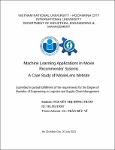| dc.description.abstract | Movie recommendation systems are an important part of modern online movie
platforms, assisting users in findning relevant and personalized movie suggestions from
large catalogs. Using the MovieLens-1M dataset, this thesis investigates the effectiveness
of three recommendation algorithms: K-Nearest Neighbors(K-NN), Random Forest, and
Matrix Factorization.
The study begins with an in-depth examnination of the Movielens-1M dataset, which
contains a million ratings from a wide of users for thousands of films. To handle missing
data, normalize ratings, and transform categorical features, various preprocessing
techniques are used. The K-NN algorithm is implemented, utilizing cosine similarity as a
distance metric to recommend movies based on user-item ratings. To optimize the
algorithm’s performance, the impact of different parameter values for K and other
hyperparameters is evaluated. The popular ensemble learning method Random Forest is
then used to generate recommendations by constructing decision trees based on user and
movie attributes.
Matrix Factorization is used in addition to user-item ratings to uncover latent
features and capture complex relationships between users and movies. The latent factors
that result are used to predict personalized movie recommendations.
To assess the performance of the implemented recommendation algorithms, evaluation
metrics such as precision, recall used. Comparative analyses are performed to identify each
algorithm’s strengths and weaknesses and to provide insights into their effectiveness in
recommending movies to different users.
Overall, by offering a thorough analysis of the K-NN, Random Forest, and Matrix
Factorization algorithms, this thesis makes a contribution to the field of movie
recommendation systems. The research results provide insightful information for creating
and improving movie recommendation algorithms, enabling better user interactions and
more active user participation on movie platforms | en_US |


